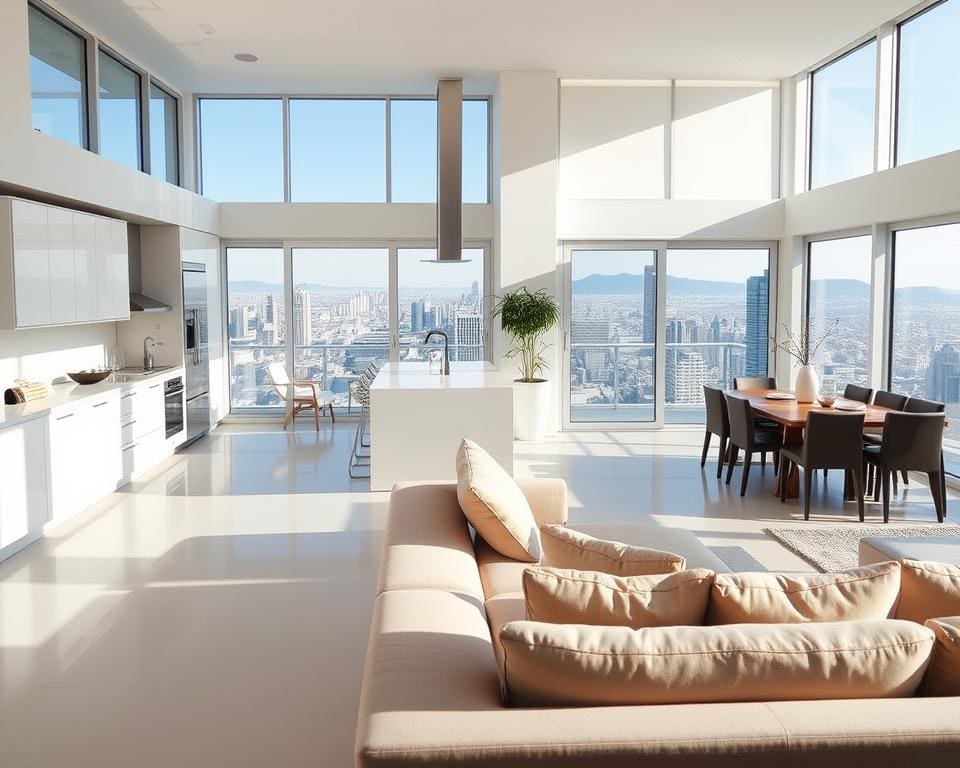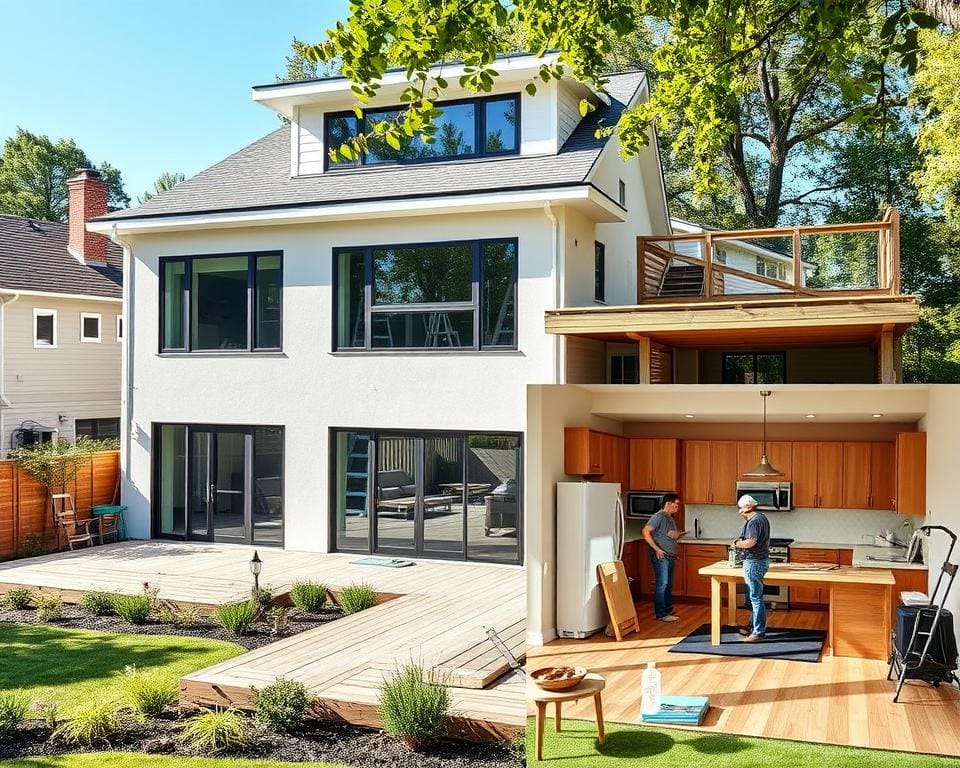The decision between home renovation and embarking on a new build is pivotal in the journey of property investment. Each option has unique advantages, and understanding these can empower you to make informed choices that align with your aspirations. Consideration of factors such as budget, lifestyle preferences, and future needs will play a vital role in your decision-making process. Whether enhancing an existing space through home improvement or starting anew with a custom design, both paths offer opportunities to create your ideal living environment.
Understanding the Benefits of Renovation
Renovating offers a multitude of advantages, making it a compelling choice for homeowners. The benefits of renovation extend beyond aesthetics, impacting finances, historical value, and project timelines significantly. Homeowners often find that tailoring an old space can yield remarkable results with preserved character and is frequently more affordable than initiating a brand-new build.
Cost-Effectiveness of Renovating
One of the primary benefits of renovation is its potential for cost-saving. Reusing existing structural elements and features can lead to a substantial reduction in expenses. By opting for renovation, homeowners can often avoid the significant expenditures associated with new constructions, such as land acquisition and extensive site preparation. This approach not only preserves financial resources but also allows for a more strategic allocation towards desired upgrades.
Preserving Historical Value
Renovation provides an incredible opportunity for historical preservation. Retaining original features while incorporating modern amenities can create a unique living space that respects the building’s heritage. Homeowners can showcase its architectural beauty through thoughtful design choices, ensuring that the charm and character of the property remain intact. This marriage of old and new enriches the overall ambiance, making it more appealing to residents and visitors alike.
Timely Completion of Renovation Projects
Compared to new builds, renovations often have a faster turnaround. A well-planned renovation timeline can facilitate quicker access to updated living spaces without the lengthy delays commonly associated with constructing from scratch. Experienced contractors usually have the methods and materials on hand, which can lead to an expedited completion and consultation on the project.

Exploring the Perks of Building New
Choosing to build new offers a wealth of advantages that cater to individual preferences and contemporary living standards. The opportunity for a custom home design ensures that every element of the house can align with your lifestyle and aspirations. Each choice, from the layout to the finishes, can reflect personal taste and functionality, creating a truly bespoke environment.
Customisation to Meet Your Needs
When engaging in modern construction, the level of customisation available is unparalleled. Homeowners can modify layouts, select materials, and integrate features that address their specific needs. Whether it’s an expansive kitchen for culinary enthusiasts or a serene home office for remote work, custom builds allow for tailored solutions that can transform a house into a home.
Incorporating Modern Technology
Technological integration in new builds has revolutionised the way we live. Smart home systems, equipped with features like automated lighting and heating, enhance comfort and convenience. Energy-efficient appliances reduce both bills and environmental impact, aligning with sustainability goals. Furthermore, advanced building materials improve energy performance, ensuring that homes remain comfortable and eco-friendly throughout the seasons.
Should you renovate or build new? Making the Right Choice
Making the right choice between renovation and building new can be daunting. This decision requires careful consideration of various factors, including current space evaluation, budget assessment, and your lifestyle needs. Each aspect plays a vital role in guiding your decision-making process.
Evaluating Your Current Space
Begin by assessing your existing living environment. Identify the strengths and weaknesses of your current space. Consider any layout issues that may need addressing, including:
- Potential for modifications to enhance functionality
- Neighbourhood characteristics and accessibility
- Future growth of the area
A thorough space evaluation not only helps determine the feasibility of renovations but also informs whether building anew might be a more suitable option.
Assessing Your Budget
Budget assessment is a cornerstone of this decision-making process. It’s crucial to examine not just initial costs but also long-term implications. Some key points to remember include:
- Estimate renovation costs versus new construction expenses
- Consider ongoing maintenance, energy use, and potential resale value
- Identify any financing options available for your project
A detailed budget assessment can illuminate the most viable path forward, ensuring financial preparedness for both short-term and long-term commitments.
Your Lifestyle and Future Needs
Reflecting on your lifestyle needs is paramount in this journey. Consider how each option aligns with your plans. Some aspects to think about include:
- Plans for family growth or downsizing
- Adapting your living situation to accommodate changing life stages
- Personal preferences for style and functionality
Understanding your lifestyle needs ensures that your space aligns with your aspirations, whether through a renovation or building a new home tailored to your vision.
The Environmental Impact of Each Option
The choice between renovation and new construction has significant implications for the environment. Understanding these impacts can help homeowners make informed decisions that align with their values and contribute to a sustainable future. A thoughtful approach prioritises sustainable practices and highlights eco-friendly construction techniques.
Sustainability in Renovation
Renovating existing structures can greatly reduce the environmental impact compared to starting from scratch. Reusing materials and retaining the original framework often leads to a lower carbon footprint. Many homeowners opt for renovation to minimise waste and preserve character while incorporating sustainable practices. Retrofitting buildings with modern, energy-efficient systems further enhances their sustainability, making them suitable for contemporary living.
Eco-Friendly Building Practices
New construction projects increasingly embrace eco-friendly construction methodologies. Many builders now focus on green building techniques that enhance energy efficiency and resource conservation. Using sustainable materials, such as reclaimed wood and recycled steel, contributes to creating a positive environmental impact. Incorporating innovations like solar panels and rainwater harvesting systems allows new builds to operate efficiently while reducing reliance on non-renewable resources.
Understanding Regulatory Considerations
Embarking on a renovation or new build project involves navigating a variety of regulatory frameworks. Awareness of planning permission and the associated building regulations is crucial for a successful venture. Ignoring these legal considerations can lead to complications that might derail your project.
Planning Permission for New Builds
Before starting a new construction project, acquiring the necessary planning permission is essential. The process often includes submitting detailed plans to your local council, who will assess your proposal in accordance with local zoning laws and planning policies. This stage ensures that the new build aligns with the character of the neighbourhood and meets the overall standards expected by the community.
Renovation Regulations to Consider
When it comes to renovations, various renovation laws apply. Significant changes, particularly those affecting the structure, may require compliance with building regulations. These regulations cover aspects like safety, accessibility, and energy efficiency. Homeowners must ensure their projects adhere to these laws to avoid potential fines or the need for costly alterations later.
Understanding construction compliance is vital not only for the initial stages but also for any ongoing work. Consultation with professionals experienced in navigating these regulatory landscapes can provide invaluable insights and support, ensuring your project flows smoothly and legally.
Design Trends: Renovation vs Building New
As homeowners weigh the options between renovation and new build designs, it is essential to consider the prevailing design trends that define each approach. Both avenues showcase distinct aesthetic choices that not only reflect personal style but also optimise functionality in living spaces.
Popular Renovation Styles
Renovation styles have evolved significantly, drawing inspiration from various eras while incorporating modern sensibilities. Homeowners often gravitate towards:
- Open-plan living spaces that foster connectivity and light.
- Mixed materials, blending wood, metal, and glass for a contemporary flair.
- Vintage modern aesthetics, combining classic elements with a modern twist.
These renovation styles illustrate how traditional designs can harmoniously coexist with innovative ideas to create visually stunning environments.
Innovative Designs for New Constructions
New builds have embraced cutting-edge design trends, focusing largely on sustainability and minimalism. The emphasis on eco-friendly materials and technologies aligns with contemporary demands for energy efficiency. Popular features include:
- Sleek lines and open spaces prioritising functionality.
- Incorporation of sustainable practices and renewable resources.
- Smart home technologies enhancing everyday living.
These innovative designs signify a shift towards modernity, appealing to those who seek a unique yet practical living experience.
Real-Life Case Studies: Success Stories
Exploring real-life case studies provides invaluable insights into the journeys of homeowners who have experienced both renovation success and new construction challenges. These success stories serve as inspiring examples that highlight the transformative nature of both approaches. Renovation triumphs demonstrate how individuals have revitalised outdated properties, while inspiring new builds showcase innovative designs that redefine living spaces.
Renovation Triumphs
Many homeowners have turned their sights towards renovation, successfully breathing new life into older properties. A noteworthy example includes a Victorian terrace in London that underwent an extensive remodelling. The owners retained original features, merging them seamlessly with contemporary aesthetics. This project exemplified how renovation success can lead to functional and striking spaces, integrating modern amenities while respecting historical elements.
Inspiring New Builds
Recent developments in new construction experiences offer a glimpse into modern living and design. A notable case study features a sustainable eco-home in Bristol, which prioritised energy efficiency and natural materials. This project not only stands as a testament to innovative building techniques but also inspires those contemplating similar ventures. Both renovation and new construction yield unique opportunities for homeowners to shape their living environments according to personal vision.
Expert Opinion: Renovate or Build New?
When contemplating whether to renovate or embark on a new build, expert advice from architects, builders, and interior designers plays a crucial role in shaping your decision. Industry opinions consistently highlight that the context of your unique circumstances greatly influences the outcome of this pivotal choice. For many homeowners, understanding the nuances of renovation vs new build is essential to align their aspirations with practical possibilities.
Professional insights suggest that renovation often allows for the preservation of character and historical value, making it an attractive option for those with older properties. Conversely, new builds provide the opportunity for customisation and modern amenities, which cater to contemporary living standards. Experts encourage individuals to weigh investment potential alongside long-term satisfaction when deciding on a course of action, ensuring that both immediate needs and future expectations are met.
Ultimately, the decision between renovating and building new is personal. Empowered by the recommendations of industry experts, homeowners can navigate this complex landscape with confidence, understanding that both choices hold valid advantages. By taking the time to assess individual lifestyle needs and long-term goals, the right choice will unfold, guiding you towards a space that perfectly reflects your vision.









